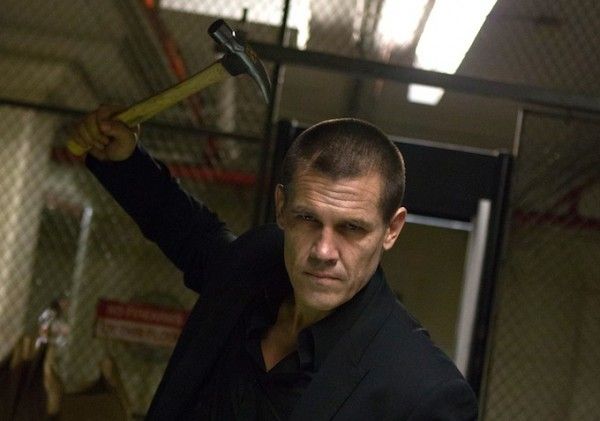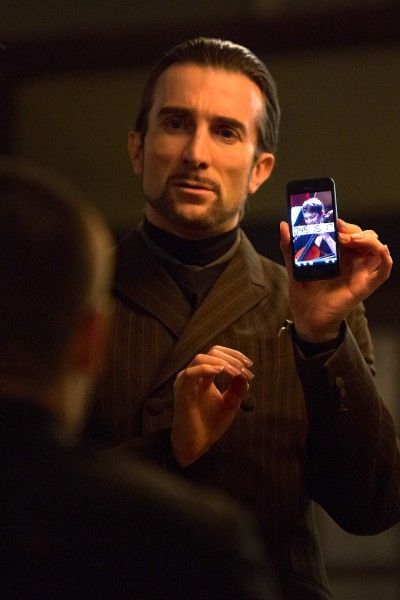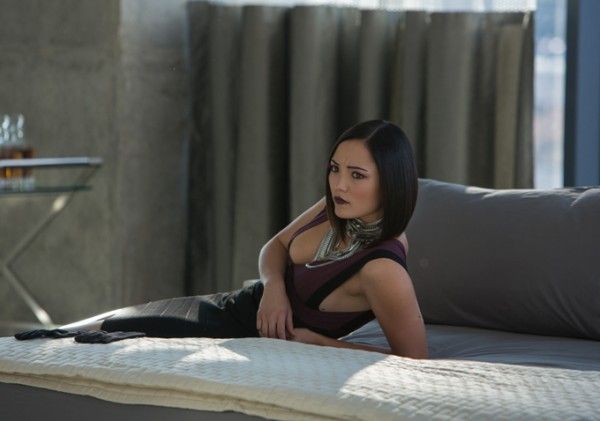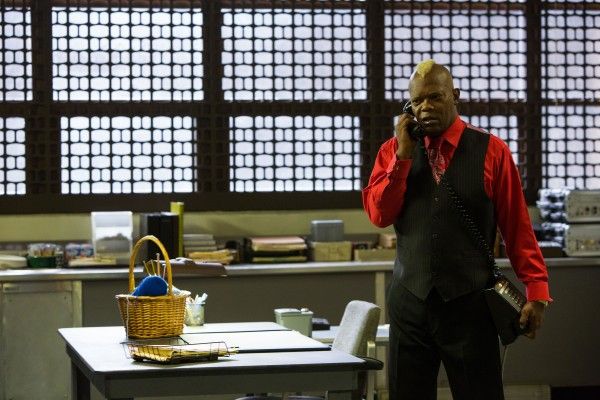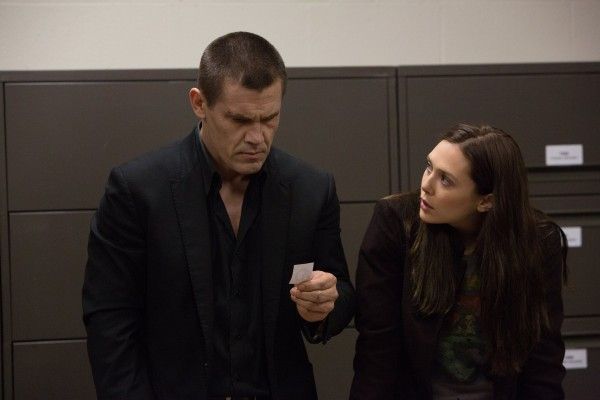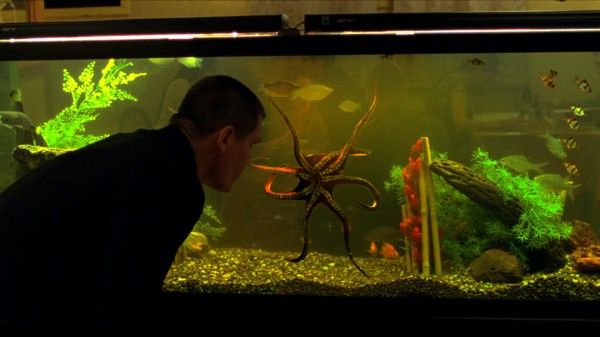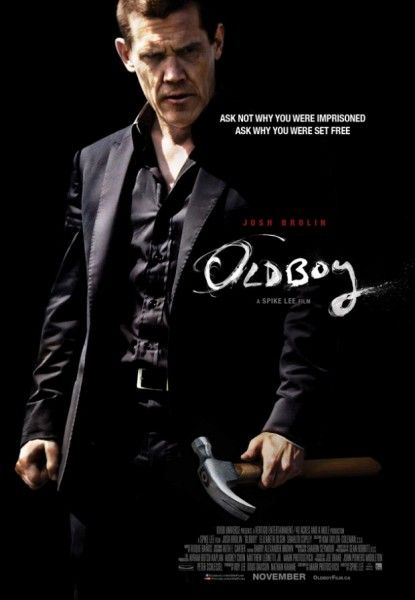Spike Lee’s Oldboy is a stylish reimagining of a legendary tale of vengeance inspired by the Japanese graphic novel by Garon Tsuchiya and Nobuaki Minegishi and the acclaimed Korean film by Park Chan Wook. Lee’s new take follows the downward spiral and unfathomable experience of Joe Doucett (Josh Brolin), who, one drunken night, is kidnapped and imprisoned in a bizarre hotel without any idea of his captor’s identity or motive. When he’s inexplicably released 20 years later, Doucett embarks on a quest to find out who orchestrated his punishment and why. The visceral thriller also stars Elizabeth Olsen, Sharlto Copley, Samuel L. Jackson, and Michael Imperioli.
At yesterday’s Los Angeles press day, Lee talked about making Oldboy his own, why he considers the film a reinterpretation and not a remake, keeping the twists and turns of the story fresh for a new audience, what Brolin and Olsen brought to their roles, why he’s confident fans and audiences will go to see this movie, Film District’s clever marketing strategy, his pet peeves about trailers today, how the process and business of filmmaking has changed since Do the Right Thing, his new HBO movie Undisputed Truth: Mike Tyson, and his latest Kickstarter project, the recently filmed Da Sweet Blood of Jesus. Hit the jump to read the interview.
QUESTION: I had a chance to talk to Josh Brolin a couple weeks ago. He said two things I wanted to ask you about. One, he said that he demanded to have the Spike Lee signature shot done on him in the film, the one with the dolly.
SPIKE LEE: I wouldn’t use the word “demanded.”
That was his exact word, that he demanded it. I wanted to ask you about that, and also, he said he talked to director Park and got his blessing to do the film before he agreed to do it.
LEE: True.
Did you also talk to director Park about it in advance?
LEE: No. I never got to talk to Mr. Park. I’m a Professor at NYU at the Graduate Film School. I’m also the Artistic Director of the School, and he showed Stoker the same night I was teaching. He doesn’t speak English. I don’t speak Korean. So, we were working through his assistant and we just couldn’t make it happen to meet each other. But I did receive an email from him translated by an assistant, and he enjoyed the trailers and was looking forward to seeing the film. I don’t think he’s seen it yet. But Josh did go. I don’t know about the specific details, but he did meet with Park because Josh wanted his blessing. Park said, “I don’t think it’s a good idea if Josh is not going to do the film.” Park also told Josh that, “Look, you have my blessing. But don’t try to redo what we did. Make your own film.” And that was my thinking from the beginning. I mean, I love Gus Van Sant (laughs), but why do that? Gus is a great filmmaker, but that’s just something I wouldn’t do. Here’s the reason why you use reinterpretation instead of remake. John Coltrane did not play the same exact thing that Julie Andrews sang in The Sound of Music. How long is that now? Sixteen minutes? My Favorite Things. I mean, it’s a 3-minute song. Many people sang My Funny Valentine, but Miles Davis’ play is different. Who knows how many people have sung The Star-Spangled Banner, but when Jimi Hendrix did it, Whitney Houston or Marvin Gaye… So that was our approach: to know that you have something that’s great, and then, in full respect of that source, just make it your own. That was the mindset. Josh and I had that mindset that we know Park Chan is great.
Was that the only time you used the signature shot in the film or were you planning to use it elsewhere?
LEE: More? No. I only do it once, one per film. I always knew I was going to do it. I just hadn’t figured out where. We were trying to figure out where we were going to do it.
Were you ever going to do it during the fight scene with the hammer?
LEE: (Laughs) That would have been the wrong space.
What were some of the things that inspired your take on this?
LEE: Working with Josh, the challenge of doing a reinterpretation because I’ve never done this before, and also knowing there are going to be people who didn’t want us to do it, that it was heresy. It was sacrilegious. And I understand because cult fans are fanatical and it was like we were messing with their mama or something. (Laughs)
Why was Josh Brolin the right guy for the role of Joe Doucett?
LEE: I can’t imagine anybody else playing that role. It’s a funny story. For a period of four years, Josh would always come to New York for a premiere of a film: American Gangster, No Country for Old Men, Wall Street 2, and there’s another film. So, four years in a row, I’d go to these premieres and I’d always meet Josh at the after party. “Oh I love your stuff! I love your stuff! Let’s work together.” Next year it was the same thing. This happened four years in a row. We’d talk about working with each other at the after party from one of these films that he was in New York for the premiere and it finally happened. Josh is a great, great actor. I love him. He loves me. We get along great. And we want to work together many more times. It doesn’t really happen that often, but sometimes we didn’t have to speak because we were thinking the same thing. We had the same outlook. We knew the film we wanted to make. So it was a wonderful experience. And also, that was not special. He gained and lost that weight. He did that himself under the supervision of dieticians and doctors. He gained 50 pounds and lost it for the role.
Did he do that in two weeks?
LEE: Less than that. Here’s the trick thing. He had to lose the weight quickly. He only lost 25 pounds over a weekend. All the time we’re rehearsing, he’s eating pasta, peanut butter, protein shakes. He’s just eating. And so, there came a point where we finished and he comes out of prison, out of the room, the jail. That was on a Friday, and that following Monday, he had to be different. So he lost it in two days, something like that. You’ll have to ask him. He lost 25 or 30 pounds. It was all water, but he had to lose it. Not something I recommend.
This has been your year for doing things that you’re not accustomed to doing. Tomorrow is the debut of Undisputed Truth.
LEE: That’s with Mike Tyson. But, you know, I directed the Broadway play, so I had the record Mike Tyson tweaks on Broadway -- that was our Broadway debuts. That was in the summer of 2012 and this past summer we filmed. We videotaped it. It’s coming out on HBO tomorrow night. It’s called Mike Tyson: Undisputed Truth and that was really it. We knew that it was going to be hard, but we brought Josh and myself, and we never run from anything. We don’t run away from hard stuff. Nothing is easy and we don’t run away from challenges either.
Having seen both versions of the film and liking both versions, one of the things that struck me about this reinterpretation is…
LEE: Thank you for using that word. Let’s get rid of the word “remake,” please, for this film at least.
I’ve been saying it for a year since I was on set. It’s interesting watching it. When an American audience watches the Korean original, there’s almost a little bit of a remove because culturally we don’t necessarily identify with…
LEE: …these exotic people.
Yeah, exactly, right? But here, I feel like it almost packs more of a punch or has the potential to for a lot of the audience because they’re not …
LEE: Well, they’re not reading the subtitles.
Do you get a little bit of a kick out of the fact that there are going to be people walking into this on Thanksgiving weekend that have no idea what they’re in for?
LEE: Oh yes. It’s going to be delightful, because people I think tend to over-magnify the fact that not that many people saw this film on the overall scope of things. First of all, most Americans don’t go see foreign films, especially Korean foreign films. Most Americans aren’t reading subtitles. So, there are going to be a lot of people who had their stomachs filled with turkey, dressing, sweet potato pie. (Laughs) Little do they know…
I was sitting next to someone who hadn’t seen the Korean version and her reaction was pretty great.
LEE: That’s what we’re hoping. But we’re going against football though. That’s tough. But there are going to be some people who are going to go. I think it was a great move, in my opinion. Film District did a great move with this. It’s called counterprogramming. I’ve done this before. People forget this, but Do the Right Thing opened the same day, June 30, 1989, as Batman. Same day. The Tim Burton/Jack Nicholson Batman. It doesn’t work all the time, but we hope history repeats itself.
Did you read the Japanese comic book?
LEE: Yes, I read it, the manga.
The Korean movie is based on the Japanese manga.
LEE: Thank you for bringing that up. I always point that out, that the original source material was Japanese. I find it very interesting. We have three interpretations of it: The origin, the Japanese manga; next manifestation, whatever the word is, Korean; and now it’s American.
It feels like there’s a certain continuity between Joe Doucett and Mike Tyson. Can you talk a little about the contrast between them and dealing with these two very complicated guys with whom you’ve spent a lot of time over the last couple of years?
LEE: I never thought about that. Mike Tyson is the most complex person I’ve ever met in my life. I’ve known Mike since 1986. We’re both from Brooklyn. I didn’t know him growing up, but once he became heavyweight champion, I knew him then. It was just great to do this piece with him because finally he gets to talk about himself, and he’s definitely one of the most honest people I’ve ever met. He’d stand on stage for 90 minutes just telling you about his life, and not all of it’s good. Most human beings will not stand in front of a stage and tell you about the bad things they did. Now he’s in front of the world because he’s going to be on television on HBO tomorrow night.
Joe Doucett? Billy Wilder is one of my favorite filmmakers, and Kirk Douglas is one of my favorite actors, and Ace in the Hole is one of my favorite films. I see it as a correlation more between… What was his name? Somebody Google it. What was Kirk Douglas’ character’s name in Ace in the Hole?
Chuck Tatum.
LEE: Chuck Tatum! I see a greater correlation between Kirk Douglas’ Chuck Tatum and Josh Brolin’s Joe Doucette. Who’s seen that film, Ace in the Hole? That movie is amazing, and an interesting thing is he did that right after Sunset Boulevard. Nobody went. A complete bomb. Same thing happened to Elia Kazan. Right after On the Waterfront, he did A Face in the Crowd. It bombed. Nobody went. But if you don’t have A Face in the Crowd, you’re not going to have Paddy Chayefsky’s Network.
I saw Undisputed Truth when it opened across the street.
LEE: At the Pantages?
Yes. When Tyson goes up on a couple tears that could be construed as misogynistic by a lot of people, the women in the audience loved it.
LEE: Here’s the thing. It is. Mike is who he is and he doesn’t apologize for it. A couple of times he might have said, “Excuse me, ladies.” Mike is a very intelligent individual, but he grew up on the streets of Brooklyn. There’s this saying, “You can take someone out of Brooklyn, but you can’t take the Brooklyn out of them.” That’s what it is.
I was just surprised at the reaction.
LEE: You know what that is? People love Mike Tyson. People love him. They know he has his problems, still, but people love him. I’ve seen it all my life. I don’t care who it is. It’s not just black folks. People love Mike Tyson.
Are you concerned at all whether your fans and your audiences who know you and know your work will follow you to this movie?
LEE: They followed me with 25th Hour. They followed me with Summer of Sam. No, that’s not even a concern. Of course, I got Sam (Samuel L. Jackson) back, too. It’s the first time we worked together since Jungle Fever. They gonna ride this mule until the mule falls over. (Laughs)
Mark Protosevich has been on this project for quite a while. When you came on board, I imagine that he had already gone through several drafts of the script. What was your main note when you got the script that you wanted to emphasize or de-emphasize?
LEE: The main note was really Lizzie Olsen’s character. First of all, Mark wrote a great script. So let’s just get that out of the way. We all – Josh and I and Lizzie -- just felt we needed the strength in Lizzie’s character. It’s not just me saying that. She said that. She’s the one who’s playing that role.
I was actually going to ask about Elizabeth.
LEE: She’s wonderful.
What struck you the most about her that is why people are lining up to work with her?
LEE: Talent. When you’re talented, people want to work with you. But for this role, we needed someone who was -- well, I don’t want to give away the whole thing -– but someone who could play those two parts of the woman that we needed for this. Someone young enough, but old enough.
Was it difficult keeping the twists and turns from the original fresh for an audience that had maybe already seen the film and wanted to see this, while also making it your own and keeping it fresh for an audience that hasn’t seen it before and not telegraphing too much?
LEE: No, we definitely don’t like to telegraph. That’s one of my pet peeves with trailers today. I almost don’t want to go… I just want to pop in when the movie starts because if you see the trailers, you see the whole movie. I understand that today, with the studios, it costs more now to make a film. The prints and ads cost more, so they really can’t take a lot of risks and they just say, “Fuck it! We’re going to show them everything.” But I’m just of the generation where you’ve got to tease. Have you ever seen those Alfred Hitchcock trailers? I understand it, but I just don’t agree with the mentality of showing the whole movie in the trailer. And with comedies, they really get you because they put in the best jokes and then you think the whole film is like that.
Or they put in jokes that aren’t even in the film.
LEE: Shenanigans! Subterfuge! Just the okie dokie. (Laughs)
Speaking of trailers, Film District has been pretty coy about the trailer for this.
LEE: Oh, they’ve been great. I’ve got to give a shout out to Film District. Their marketing of this film has been phenomenal.
That was my question. (Laughs) The first TV trailer went out yesterday or the day before yesterday which seems a little bit tight for most releases. Was that your choosing or theirs?
LEE: Did you want it to come out earlier?
We’re in a cycle now where trailers are coming out six or eight months in advance and you’ve got the teaser trailer and the teaser before the teaser.
LEE: We have to realize this is not a 3,000 theater release. We’re going to roll off in 550, so it’s very well thought out and I’m happy with it.
I spoke with Ruth Carter last night who’s worked with you on several films. Can you talk a little bit about your long term collaboration with your creative team?
LEE: Ruth Carter, a two-time Academy Award nominee for Best Costumes for Malcolm X and Amistad. Ruth’s first film was School Daze and we’ve worked on and off since. In 2013, she just did the costumes for my new film, my Kickstarter film, which is entitled Da Sweet Blood of Jesus. “Da” is spelled d-a, not t-h-e. Da Sweet Blood of Jesus. Ruth did a phenomenal job on that. She’s great.
Can you talk a little bit more about Da Sweet Blood of Jesus?
LEE: It’s a Kickstarter film. It will be a Spike Lee Joint. (Laughs) It’s about people addicted to blood, but they’re not vampires. We talk about it, but really blood is a metaphor. In this film, Mississippi people are addicted to blood, and as we all know, human beings have many addictions: drugs, sex, alcohol, power, money, Air Jordans. (Laughs) Whatever it is, we have addictions, and in this one, people are addicted to blood. It’s a contemporary film. We shot in New York and Martha’s Vineyard and we’re editing it now. We shot it in 16 days, one day ahead of schedule. The goal was to raise $1,250,000. We raised $1,400,000. I loved all the people who backed this film. The male lead’s name is Stephen Tyrone Williams, a young Broadway actor. You might have seen him in Lucky Guy, the Nora Ephron film that was on Broadway this summer with Tom Hanks. The female lead is a woman named Zaraah Abrahams, a black Brit actress. I saw one of my student’s thesis films and she was a co-star. I asked my student, “You cast…? You got it flipped. She should have been the star.” I tracked her down, and I flew to London, and she’s the lead. There are phenomenal performances in this film.
Is it scary?
LEE: It’s scary, humorous, bloody, sexy. Go for this one!
In filmmaking, so much has changed since School Daze and Do the Right Thing --from going digital to even the way people use social networking. How have the process and the business changed for you since then?
LEE: Very good question. Thank you. Well, the world has changed. For me, here’s the interesting thing. I was being attacked for being on Kickstarter and I just had to break it down. I used the principles of Kickstarter to make She’s Gotta Have It. We filmed that in 1985 to 1986. The final cost was $175,000. I didn’t have that money. It was friends, grants, donations. We saved our bottles for the nickel deposit. So, the same principles we used for She’s Gotta Have It I used for Kickstarter, but now we just have technology. There was no Twitter. I had to write pen to letter and postcards asking people for money. But I don’t get tripped up in technology. I use technology as a tool. Oldboy we shot Two Pro 35mm. For Da Blood of Jesus, we shot digitally. We shot the new Sony F55. It’s a 4K camera.
And what’s your editing process?
LEE: We’re Avid. I don’t cut on the Steenbeck anymore. I got ‘em. Anyone want to buy a Steenbeck? (Laughs)
Has that changed the process for you in post-production as far as assembling the film?
LEE: Yes, but you know what’s good though? It used to kill me after you work all day to watch three hours of dailies. Now I just get a link or a DVD and I watch it when I want to watch it.
What do you feel you learned from the Kickstarter campaign?
LEE: That it’s hard. That’s one of the hardest things I’ve ever had to do. That is no joke. That 30 days? That was a 30-day campaign and every day. If you called 40 Acres during that time, you were lucky if someone picked up the phone because we would all work on that. Failure was not an option. We had to get that money. We had to.
When people say, “Why don’t you put your own money in?,” they forget that you did with Red Hook Summer.
LEE: Oh yes. I financed Red Hook Summer. Also, thank you, Jesus, I got the Lillian Gish Award recently and all that money is going into the film, too. That came out of nowhere. I’d never even heard of that award.
What has been the biggest surprise for you about becoming a director? Did you used to dream about becoming one?
LEE: I didn’t dream about being a director. I didn’t know I wanted to do something with film until the summer between my sophomore and junior years at Morris College in Atlanta, Georgia. I was a little kid. Nowadays, it’s like, “Yes, I saw Star Wars. I saw…” Whatever the film is. Do I want to be a filmmaker like that? I didn’t have that type of moment. I’m just happy that I’ve been able to continue what I’ve been doing and move forward.

